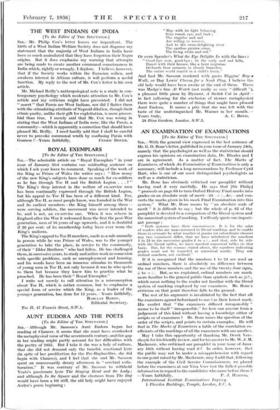ROYAL EXEMPLARS
[To the Editor of THE SPECTATOR.]
SIR,—The admirable article on " Royal Exemplars " in your issue of January 31st contains one misleading sentence on which I ask your leave to comment. Speaking of the work of the King as Prince of Wales the writer says : " How many of the new King's subjects have done as much for ex-soldiers as he has through Toe H and the British Legion . . ? " The King's deep interest in the welfare of ex-service men has been continually expressed through the British Legion, but his appeal to Toe H has been of a different kind. For, although Toc 1r, as most people know, was founded in the War and its earliest members—the King himself among them— were serving soldiers, the movement was never intended to be, and is not, an ex-service one. When it was reborn in England after the War it welcomed from the first the post-War generation, men of 16 years of age upwards, and it is doubtful if 20 per cent. of its membership today have ever worn the King's uniform.
The King's appeal to Toe H members, made as a rule annually in person while he was Prince of Wales, was to the younger generation to take the place, in service to the community, of their " Elder Brethren " who had fallen. He has challenged them, in successive years, to study and active work in connexion with specific problems, such as unemployment and housing, and his words have been an immense stimulus to thousands of young men in Toe H, not only because it was he who spoke to them but because they knew him to practise what he preached. He has been their " Royal Exemplar."
I write not merely to call attention to a misconception about Toc H, which is rather common, but to emphasise a special form of service which the King, as a leader of the younger generation, has done for 15 years.—Yours faithfully, BARCLAY BARON,














































 Previous page
Previous page